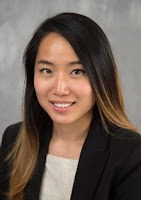Originally from Hawaiʻi, Kacie Ho received her bachelor’s of science in food Science and human nutrition from the Hawaiʻi at Mānoa. She made a crucial decision to brave the cold winters in West Lafayette, Indiana, to complete a Ph.D. at Purdue University in food science. During her time as a graduate student, Kacie had the opportunity to intern for Cargill in Minnesota and to conduct research at Wageningen University in the Netherlands. After graduating in 2017, she held a teaching postdoc at Wageningen University and a research postdoc at the Plants for Human Health Institute (Kannapolis, NC) through North Carolina State University. Kacie is currently an assistant professor of food science in the Department of Human Nutrition, Food and Animal Sciences at her undergrad alma mater, the University of Hawaiʻi at Mānoa.
Describe your research and explain what big challenge or problem your work is trying to solve.
My research has two main themes: bioactive compounds and food colloids. The first is related to characterizing and identifying nutritional and phytochemical profiles in tropical commodities. This work has direct impacts for my local responsibilities as a scientist in Hawaii as we aim to add value to our unique tropical commodities, to improve the health and well-being for the Pacific, and to enhance the economic activity of our local markets.
Beyond this, much of our findings have broader implications worldwide as we identify nutrients, toxicants, and factors that affect bioavailability for a variety of food products. The second theme of my research is related to colloidal systems and food structuring to enhance stability, quality, and nutrition of food and food ingredients.
How do you hope or how has AOCS helped in solving challenges you encounter in your work and/or research?
AOCS has been great organization to be involved with because of the networking opportunities you can get with other experts in the field or with potential collaborators or employers. I first got involved with AOCS as a graduate student and have thoroughly appreciated all the opportunities to engage with other scientists and to get involved through various volunteer opportunities.
Please share a turning point or defining moment in your work as a scientist.
I’ve been fortunate to have many great mentors and opportunities to learn and grow as a scientist and professional. One of those defining experiences was conducting research in the Netherlands as a visiting scientist. The structure of their Ph.D. program was a bit different (in terms of coursework and supervisory responsibilities) from what I had seen in the US, and I was even given the opportunity to supervise a M.S. student during my time there. That experience really helped me to gain a new perspective and allowed me to envision a future career in academia.
What do you like to do when you are not in the lab or presenting at meetings?
When I’m not officially on the clock, I enjoy hiking or even just going on walks outdoors. As scientists/professionals, it’s easy to let our minds continuously race all the time. However, it is refreshing (and ultimately helpful for long-term productivity) to get some fresh air and to observe the sky.
Do you have any words of wisdom for other AOCS YP CIG members?
Based on my experiences and hearing from grad school friends who are now in industry, academia, and government, I think it is very helpful to get involved in volunteer work or service related to your profession early on. These experiences help to develop your professional and organizational skills while also helping you to gain a broader perspective of your field. Also, it is a great way to get to know others better!



No comments:
Post a Comment